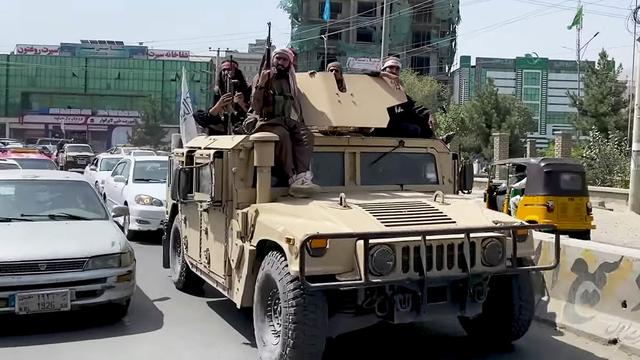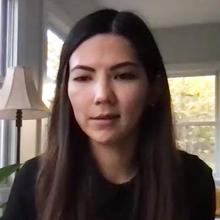When the last U.S. military forces departed from Afghanistan in August, the Taliban swiftly took control of the country.
During the chaotic two-week withdrawal process, more than 120,000 people were evacuated.
In the aftermath, questions are being asked about how the Taliban was able to regain power so quickly after 20 years of U.S. involvement; how it will govern the country; and what the change means for U.S. foreign policy going forward.
Three Humphrey School global policy experts: Associate Professor Dipali Mukhopadhyay: Diplomat-in-Residence Mary Curtin: and PhD student Nasema Zeerak, a native of Afghanistan: discussed those questions in an online forum in late October.
Here are some excerpts from their conversation, edited for length and clarity.
On why the Afghan government collapsed so quickly after the U.S. withdrawal:
Dipali Mukhopadhyay: The United States invaded Afghanistan to its own ends. And it did so in terms that really crippled any efforts that were ancillary at building capable democratic institutions of government.
The American project was about vengeance [after 9/11], in which state building became a means to an end. Regimes that are created in a project like that are set up to be loyal to and dependent on outsiders, and so, in that sense, they are designed to ensure rather than overcome weakness.
The Karzai regime [which came to power in 2001] owed its existence to the military campaign that the Americans and their allies waged and, in exchange, it was given the opportunity to begin a new chapter of Afghan state formation. But it was to do so in terms that limited its ability to control or influence power, politics, and violence across its territory.
In exchange for recognition and enormous amounts of aid, the Afghan state would "rent" its territory to outsiders, who were seeking to avenge the attacks of 9/11 and to eliminate the safe haven for Al Qaeda. These decisions were being driven by the US and its allies, and they were severely constraining the movement for a new government.
[Karzai and his successor, Ashraf Ghani] followed their impulse to use the state in the service of their own political survival and they did that by using whatever currencies they had access to, whether that was connections to the diaspora, or relationships with leaders of particular tribes or militant factions. Ultimately, both were profoundly vulnerable to the vagaries of their international patrons.
The American pivot to peacemaking was made with the same strategic incoherence that marks much of the warfighting. You have a government in Washington that is simultaneously supporting and defending a besieged government in Kabul, even as it is negotiating with that government’s sworn enemy [the Taliban] on that enemy’s terms.
And once the decision to end the war came, any leverage the U.S. government could have over the Afghan government, its ostensible partner, it gave away by making very clear that no matter what kind of a peace process did or didn't unfold, the Americans were leaving.
As a result, the Afghan security sector was left holding the bag, not because soldiers were unmotivated to take on the Taliban, but because the entire fighting apparatus of the security sector—from design to operation to maintenance—was really reliant on the Americans: American contractors, American air power, and American knowledge. And all of that disappeared overnight.
So when the Taliban took city after city, it was not because there was some groundswell of popular support for this insurgency. It was because the American withdrawal triggered a series of elite defections based on a rational calculation that the Afghan government could not survive the American departure.
On misperceptions and stereotypes about Afghanistan:
Nasema Zeerak: Stereotypes and misrepresentations have become a form of knowledge about Afghanistan, even in very serious high-level conversations and presidential briefs and policy discussions. Stereotypes such as the graveyard of empires, or tribal Afghanistan, unruly or violent Afghans—they appear over and over again. We don't talk in these terms about any other country. Why is it that Afghanistan is only understandable through stereotypes?
The term ‘tribal Afghanistan’ is often used to describe the country and its politics in a very unsophisticated manner.
President Biden, after the fall of Afghanistan, in order to absolve himself, said Afghanistan was a tribal country that has never ever been united with each other. Using that term really invalidates the entire country.
I also want to focus on the misrepresentation of Afghan women. On the one hand, we declare that Afghanistan is a tribal country—people come together in their communities, they're always entrenched in their tribal affairs, they can never be united. But when we talk about Afghan women, it is by singling them out, by taking them out of their context and their histories.
There is a maddening obsession with the way we profile single Afghan women. We don't consider their tribes or their communities or their families; we take them on their own as individuals—profile them either as victims of savagery, or as women who have been liberated and are free, by singing Bob Dylan songs or by skateboarding or something.
There's this assumption that if we save one Afghan woman at a time, all Afghan women are going to be saved. And there's the assumption that all Afghan women are the same, no matter where they are and what they do. We should be asking ourselves: why do we need to construct Afghan women as victims, that need to be saved?
On post-9/11 US foreign policy:
Mary Curtin: My perspective comes from someone who was a career diplomat, including during the first 10 years of the war in Afghanistan. I've reflected about this war, but also the war in Iraq and other military actions that came to dominate our foreign policy since September 11, 2001.
All too often, foreign policy makers operate without deep thought about the people who are objects of their policy. If a military response— either to an attack or to a situation in which people are endangered—is justified and viable, what happens after the attack is made? That’s part of what I saw as a deeply flawed policy in Afghanistan.
It proved relatively easy, after an initial overwhelming military attack, to defeat the Taliban, remove them from government, and take over the capital. The difficult part is that the United States took the lead on creating a government that it wanted, and to achieve the ends that it wanted. It was doomed to fail. It also created a conundrum for U.S. policymakers, who may have seen what was wrong in that approach but did not know another way to end a bad war.
More broadly, post-9/11, I think there were many countries that questioned and at times were shocked by things that the United States did in response to what was a shocking attack on the U.S. That goes to the broad political decision-making process, including Congress and voters, about how the United States thinks about its role in the world.
On support for the Taliban among the Afghan people:
Zeerak: I do think there's limited support for the Taliban inside Afghanistan. And the reasons are complex.
Who would want to live under a Taliban regime where women are not considered human beings, where they don't have their basic rights? Why would people support the Taliban when they're implementing their brutal form of Sharia law and some people are desperate?
There is some limited support for the Taliban, because under President Ghani’s regime, the Afghan people didn't have their basic needs met.
It's also because people in the last 20 years were sick of the drone strikes, they were sick of the civilian casualties, of the collateral damage, of the poverty, of war, of having every single family losing a family member, of this endless conversation of democracy and election and peace and war, all at the same time.
The same way that the U.S. was trying to win hearts and minds, the Taliban had their own strategy of winning hearts and minds. In the remote parts of Afghanistan, they were paying for recruits into the Taliban. There were families who didn't have food, who needed money, and so of course they joined the Taliban; of course they supported the Taliban.
On the strength of the Taliban and how they will rule going forward:
Mukhopadhyay: The Taliban is one of the most exceptionally successful insurgencies in modern history—the ability to maintain a coherence as an organization, the ability to sustain multiple leadership transitions, the ability to last for 20 years and, of course, the ability to force the world's most powerful military into a posture of surrender.
One indicator of whether an insurgency will last is whether or not it has sanctuary. So it is impossible to understand the success of the Taliban without recognizing that it had continual safe haven and extensive support from the Pakistani security establishment from the beginning, from its conception in the 1990s onward.
That meant that at moments when soldiers needed a reprieve, when they needed to be replenished, resupplied, re-armed, re-inspired, there was a space for them over the border in Pakistan, where the U.S. and Afghan military could not go to fight them.
The entire leadership of the Taliban resided not in Afghanistan, but in Quetta, a city in Pakistan. And it wasn't a secret. Many of those leaders have been in exile there for decades. So the decision making within the Taliban cannot be separated from the leadership of the Pakistani ISI, the security wing of the military establishment there.
For a lot of Afghans it seems like foreign occupation, and the cabinet that the Taliban has named reflects nothing of the country's diversity. And even if the democracy was profoundly flawed over the last two decades, citizens did grow accustomed to forms of representation and the ability to actually access public goods, to access political power, that the Taliban has foreclosed overnight.
It's a very open question, I think, how the Taliban will manage the needs and expectations of the plural public that has already shown signs of resistance. How much can it impose by fear? At what point is it pushed into different kinds of engagement, or will it collapse?





